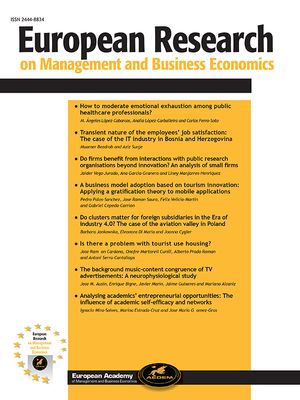El objetivo de este trabajo es analizar si el nivel de postmaterialismo explica las diferencias de los ratios de actividad emprendedora de las Comunidades Autónomas Españolas. A tal efecto se distingue entre emprendedores potenciales, empresas nacientes, nuevas empresas y empresas establecidas, tal como se definen en el Global Entrepreneurship Monitor (GEM). El postmaterialismo se ha medido según el índice para cuatro ítems de postmaterialismo de Inglehart. Se han incluido variables económicas, demográficas y sociales para investigar el papel independiente que juega el postmaterialismo para predecir los niveles de actividad emprendedora. Los resultados confirman la importancia del postmaterialismo para predecir la actividad emprendedora y cómo su importancia varía en función de la etapa de la creación de empresas que se considere (concepción, nacimiento o permanencia).
The aim of this paper is to explore whether postmaterialism explains differences in Total entrepreneurial-activity rates across Spanish Autonomous Communities. A distinction is made between potential entrepreneurs, nascent entrepreneurship, new business formation and Established business, as defined within the Global Entrepreneurship Monitor (GEM). The measure for postmaterialism is based upon Inglehart's four-item postmaterialism index. A set of economic, demographic and social factors is included to identify the independent role postmaterialism plays in predicting entrepreneurial activity levels. Findings confirm the significance of postmaterialism in predicting total entrepreneurial activity and its importance varies depending on the stage of business creation considered (conception, birth or residence).





